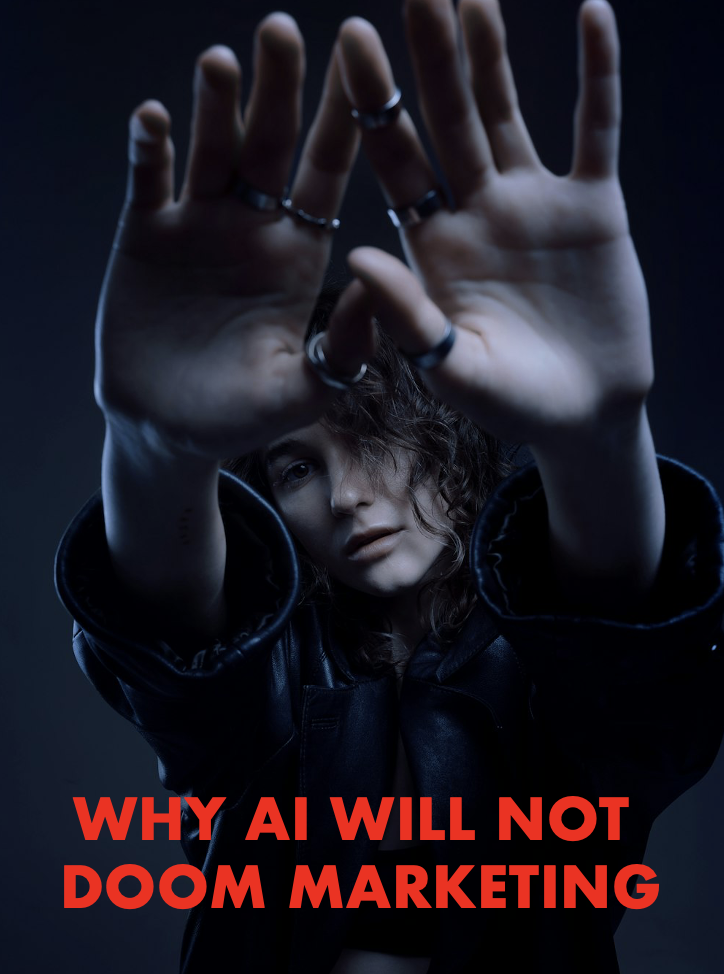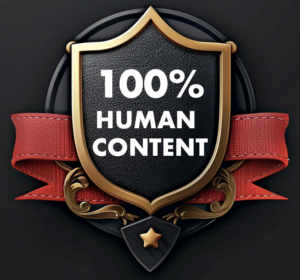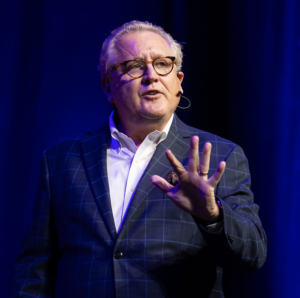
The world is going bonkers over a bombastic claim implying that AI is the doom of marketing.
On a recent episode of the Artificial Intelligence Podcast hosted by Paul Roetzer and Mike Kaput, the hosts referred to an interview of Sam Altman on a site called Our AI Journey.
The interview is behind a paywall, but Paul relayed this specific quote about the doom of marketing and Artificial General Intelligence (AGI). Paul noted that it is unusual that Altman would comment on something so specifically. Here it is:
“Oh for that (marketing) it will mean that 95% of what marketers use agencies, strategists, and creative professionals for today will easily, nearly instantly, and at almost no cost be handled by the AI. The AI will likely be able to test the creative in real or synthetic customer focus groups for predicting results and optimizing. And free, instant, and nearly perfect images, videos, campaign ideas — no problem.”
You can see why a quote like this would twist your shorts.
The quote went viral and spurred some heated online discussion. Is this true? Will we be losing 95% of our marketing jobs?
The answer is no, and I’d like to tell you why.
Human-based marketing success
Over the years, I’ve worked with many different companies and featured their tales in my books and blog posts. Here are a couple of my favorite marketing success stories (I promise, this is leading somewhere!) …
To launch the second season of WestWorld, HBO hired Giant Spoon to re-create the set of the TV series in an abandoned town outside of Austin, Texas. More than 60 actors enacted scenes from the show as guests from SXSW posted more than a billion impressions on social media. This required a collective collaboration across dozens of disciplines from design to set-building. Here’s a video glimpse of the project:
Yeti rapidly became a major U.S. retail brand, but for the first five years of the company’s existence, its only marketing tactic was word-of-mouth marketing. The company partnered with trusted outdoor guides to tell the story of Yeti and drive sales of its premium ice cooler. Today, Yeti is a $4 billion brand with a wide range of products.
 Although Sephora has stores in nearly every major city in the world, 80% of their sales come through the company’s online community. Their most important metric is human “engagement” with customers, demonstrating that new ideas, products, and content are relevant — a leading indicator to sales.
Although Sephora has stores in nearly every major city in the world, 80% of their sales come through the company’s online community. Their most important metric is human “engagement” with customers, demonstrating that new ideas, products, and content are relevant — a leading indicator to sales.
When I was with a Fortune 100 company, my team worked with an anthropologist to observe how people used different products in their homes. We discovered that most people don’t use the back of their refrigerator shelves—this is where the scary stuff lives! With partners, we designed and patented the now-famous long “fridge pack,” which productively used this space and became one of the most important packaging revolutions in beverage industry history.
Another company innovation I helped lead was spurred by an off-hand customer comment at the end of a “listen to the customer” visit. Responding to the casual idea he expressed led to a multi-million-dollar development project and a long-term competitive advantage for the company. We never would have found that idea through an online survey.
Thanks for obliging me on this trip down memory lane.
I needed to briefly showcase the variety of marketing possibilities and the importance of human beings in the mix. How many of these success stories could have been eliminated by AI?
The answer is obvious: None of them.
AI is not the doom of marketing
Let me be clear. AI will replace many jobs, especially those based on repeatable patterns, such as data analysis, creative treatments, content development, and formulaic sales pitches.
But marketing is specifically about creating and keeping customers. And human customers do not necessarily follow patterns because they are emotional, irrational, and ever-changing.
Sam Altman is a smart guy. He’s in the middle of the AI world, and I am not. But I am in the middle of the marketing world, and he is not. And while he is correct that AI will replace a massive number of marketing tasks, most marketing jobs will not go away for these five reasons:
1. Importance of human connection
The subtitle of my Marketing Rebellion book is “The Most Human Company Wins.” This is undeniably true. In a fragmented and disconnected digital age, we value more authentic human interaction, not less.
Marketing often involves building relationships and trust with customers. Human marketers are better equipped to understand and respond to the nuances of human communication, empathy, and personal connections that are crucial in many marketing roles. Altman isn’t considering this important aspect of marketing.
As I showed in the example above, YETI is a $4 billion brand because of human connections, period.
2. The mandate for weird
Great marketing isn’t about conformity and following patterns. It’s about non-conformity and breaking patterns. When it comes to non-conformity, humans have the edge because we love to be weird. Great marketing is weird. I mean, have you looked at TikTok lately?
I hired a creative director once because she sent me a box of homemade cookies. Is that marketing? You betcha. And the reason it worked is because it BROKE a pattern. She stood out because she didn’t just send me an email or a resume, she sent me cookies. AI is amazing because it helps us detect patterns, but we often create customers by breaking patterns.
Perhaps the king of viral marketing is Who Is The Bald Guy (aka Michael Krivicka). His videos are warped and demand our attention. Here’s an example:
These elaborate videos are possible only by breaking patterns through an intense amount of …
3. Human collaboration
Great marketing almost always involves collaboration among team members with diverse skills and perspectives. Human marketers are essential in fostering teamwork across the organization, facilitating complex communication with agency partners, and overseeing creative problem-solving.
Hundreds of people were involved in the Giant Spoon Westworld activation. AI will make these interactions faster and more effective, but we’ll still need the human collaboration. Breakthrough success doesn’t come from thinking out of the box, it comes from combining the boxes. AI will help that but not replace it.
As I look back on my career, every major success story was achieved through collaborative, cross-disciplinary human efforts.
4. Insight beyond a database
I provided the example of discovering a crucial customer idea from a random comment at the end of a live meeting. There is no database in the world that could have delivered that idea. How did it happen?
- I was in a live meeting
- The people in the meeting trusted me enough to be open and honest
- My experience and specific industry knowledge allowed me to realize that off-hand comment was important
- The trust I earned within my company allowed me to get a multi-million-dollar project approved that created a new, profitable product.
Similarly, the breakthrough idea about the back of the refrigerator came from detailed human observation. That is a profound marketing success and 100 percent human.
Think about it this way. Do you have a competitive advantage because your business is on the internet? Of course not. Everybody’s on the internet. Similarly, everybody will have AI integrated into our key marketing tools and that AI will be mining (mostly) the same historical datasets.
In the short-term, you might establish a competitive advantage if you apply AI in a creative way and achieve first-mover advantage, but in the long term, AI will be an enhanced business tool everyone will access. Competitive advantage can still come from human insight.
5. Ethical considerations
Marketing decisions often involve ethical dilemmas, such as respecting consumer privacy, avoiding deceptive practices, awareness of evolving cultural sensitivities, and promoting social responsibility. Following the law is easy. Doing what’s right is not always so obvious. Human judgment is essential in navigating these complex issues.
As I write these words, there is news all over the web about AI companies indiscriminately breaking the law to bring copyrighted content into their insatiable data machines. There is a historical pattern of recklessness in the tech industry and it will take ethical, human business leaders to use AI in an appropriate manner.
Where do we go from here?
If you’ve been reading my blog for some time, you know I’m a realist. I do my best to tell the story of marketing in a fair and truthful manner. I’ve been immersed in the world of AI. I study it every day. I’m not naive and I certainly have a healthy amount of fear as I consider our AI-driven future.
This post is not meant to sugarcoat a threat; it’s simply a more holistic perspective of how marketing works. The fatal flaw in Altman’s comment is that he’s considering a small subset of the marketing world —a number of tasks he might observe from a relationship with an outside marketing agency.
Will AI impact your career? Absolutely, no matter what you do.
AI, and especially AGI, will transform the marketing landscape and automate many tasks. It will eliminate many entry-level jobs dedicated to copywriting, video production, social media management, research, and more. A recent WSJ article projected that college graduates hoping to get a knowledge worker job must be prepared to step into middle management positions because the low-level jobs will be gone. Huh? How is that going to work? Probably worthy of a separate blog post.
However, AI is not the doom of marketing. It is unlikely to eliminate the majority of marketing jobs, at least in the foreseeable future. Instead, the role of human marketers will evolve to focus on higher-level strategic thinking, creative cultural insight, and human connection. That’s how customers are created.
The Most Human Company Wins. Don’t lose sight of that, and you’ll be OK.
 Need a keynote speaker? Mark Schaefer is the most trusted voice in marketing. Your conference guests will buzz about his insights long after your event! Mark is the author of some of the world’s bestselling marketing books, a college educator, and an advisor to many of the world’s largest brands. Contact Mark to have him bring a fun, meaningful, and memorable presentation to your company event or conference.
Need a keynote speaker? Mark Schaefer is the most trusted voice in marketing. Your conference guests will buzz about his insights long after your event! Mark is the author of some of the world’s bestselling marketing books, a college educator, and an advisor to many of the world’s largest brands. Contact Mark to have him bring a fun, meaningful, and memorable presentation to your company event or conference.
Follow Mark on Twitter, LinkedIn, YouTube, and Instagram
Illustration courtesy Unsplash.com


